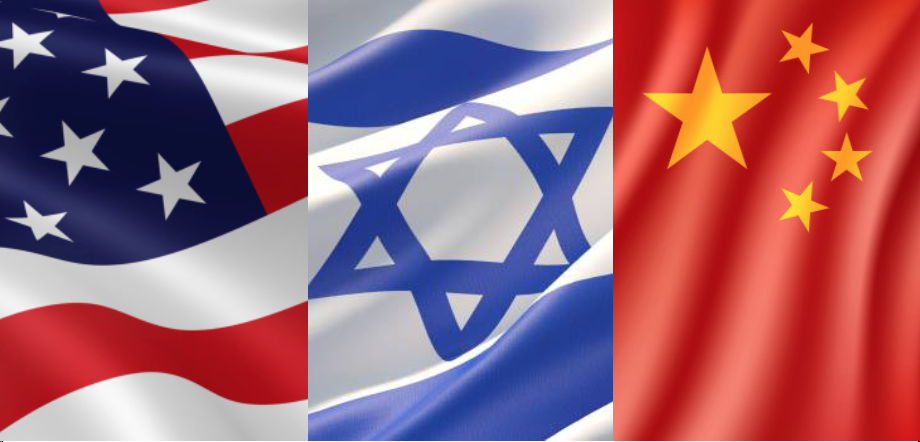Photo credit: JINSA
As Israel formulates its approach to the Biden administration, one priority needs to be the development of a cooperative strategy for addressing China and its rise. Israel and the United States view China differently, and that divergence will remain a source of bilateral tension until a joint approach is formulated.
The urgency of a joint US-Israel approach to China is highlighted by two recent developments. First, a group of Israelis were arrested by the Shin Bet (Israel Security Agency) last month for selling drones to China, reflecting yet again Beijing’s keen interest in Israeli technology to help fuel its global rise.
Second, a slew of articles breathlessly reporting a US request, which Israel did not accept, that the US Coast Guard be permitted to inspect Haifa Port, where a Chinese company is constructing a shipping terminal near docks frequently used by the US Navy. The Jewish Institute for National Security of America (JINSA) first reported this US request in its recent report on Chinese activity in Israel, and we stand by the accuracy of our information. The fascination with this story – and the rush to deny it – highlight the strong need for profound and well-coordinated US-Israeli dialogue when it comes to delicate matters with clear national interests at stake.
The United States, for its part, seems fixated on individual cases of Chinese activity in Israel, like Haifa Port, when the problem is much more systematic. Beijing seeks not only to buy Israeli defense technology illicitly, but uses legal investments into Israeli infrastructure and start-ups to gain access to civilian Israeli technology that it can monetize or adapt for military purposes. Washington has a clear interest in stopping such Chinese penetration of Israel’s economy.
Israel gets defensive about American complaints because it is in a different position and takes a different outlook in foreign policy. The Jewish state remains a smaller power with a smaller economy compared to America, with a more transactional approach to international relations. It views China as a major power with a permanent seat on the UN Security Council, whose people and government are not inherently antisemitic or antagonistic (as some Western countries are).
Beijing, despite its economic ties with Iran, has become a growing economic partner for Israel. And given general American retrenchment from the Middle East, and at times engagement of arch-enemy Iran, it behooves Israel to remain on good terms with China. Moreover, Israel views US-China economic ties as still very strong, despite American posturing. Yet, Israel also is viscerally part of the West, and keenly understands that its most important strategic ally, with which it has so much in common and can collaborate on so many fields, is the US.
Thus, Israel has been slow to match America’s more recent growing concern about China.
Although Israel has been cooperative with US concerns about Chinese acquisition of Israeli military technology, it has only made minor policy adjustments when it comes to civilian and dual-use technology. That is partly a result of Israel’s assessment that the economic downsides to “decoupling” from China, as the United States and Western countries are moving to do, outweigh any security benefits.
Yet, predatory Chinese economic activities do pose real economic and security threats to Israel. China’s theft or acquisition of intellectual property threatens the innovation that has made Israel the Start-Up Nation; its willingness to cut economic and military deals with Israel’s enemies, like Iran, threatens Israeli security.
Still, the real threat that China poses is to the US-Israeli partnership.
That partnership has been strengthened over the last two decades by shared threats from common enemies in the same geographic region. Such an overlap of interests will not persist; it is already fading as the US looks beyond the Middle East to new global challenges. If the two partners cannot find ways to cooperate despite prioritizing different security threats, they could either slowly drift apart or even fall out over recriminations that neither is doing enough to help the other, such as with Haifa Port.
The US-Israel partnership is too important to let China become a wedge. The United States has no better, more capable or determined partner anywhere in the world. And Israel has no more committed or generous ally.
It is imperative, therefore, that Washington and Jerusalem upgrade their partnership to match the new era of great power competition. That means adopting a comprehensive and cooperative strategy for dealing with China, particularly preserving their joint qualitative technology edge over Beijing. In its report, JINSA recommends three major steps.
First, Israel must recognize it lacks a comprehensive and coordinated strategy toward China. This requires designing new laws and institutions to protect the Israeli economy.
Second, the United States should understand that China is not a preeminent strategic priority for Israel, that making demands of its partners is an unproductive approach, and that there are real costs for Israel in taking steps to address China’s penetration of its economy. To this end, the United States should consider economic collaboration to incentivize Israel to take a tougher stand.
And third, on a cooperative level, the US and Israel need to formulate a new conception of their partnership that encompasses not just security but also economic and technological cooperation. First steps should include signing a bilateral investment treaty, updating the current US-Israel Free Trade Agreement, and pursuing more joint research and development initiatives.
The United States and Israel must confront the growing China threat but, more importantly, they must do so together.
Michael Makovsky is a former Pentagon official, and current president and CEO of JINSA. Yaacov Ayish is a former Israeli defense attaché to the US and Canada, a former head of the IDF General Staff Operations Branch, and current senior vice president for Israeli affairs at JINSA.
Originally published in The Jerusalem Post

